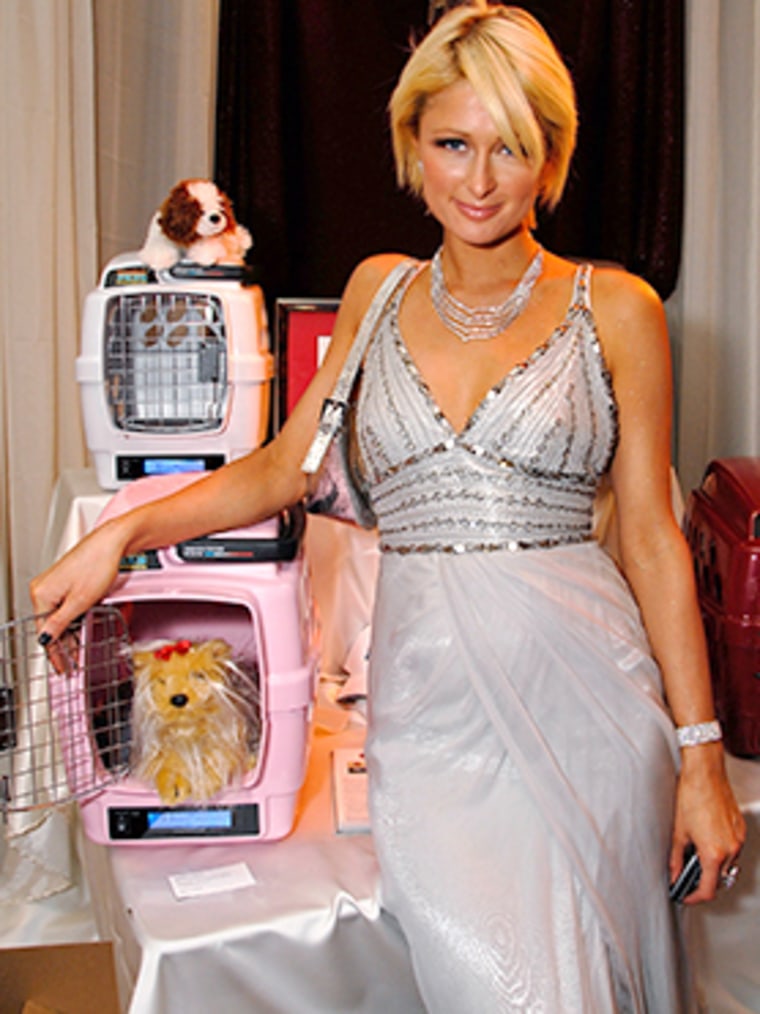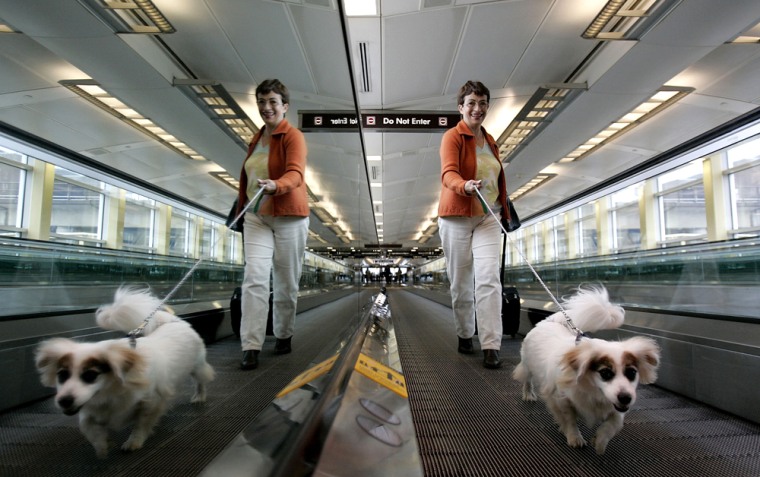Purchasing an airline ticket is like building a computer online — the final cost far exceeds what you had in mind. With airlines, first there were add-ons for food and drinks, then it was baggage fees, and with some airlines, even snacks. Now, we’re going to have to pay more for our pets to fly too.
JetBlue has raised their one-way pet fee for in-cabin travel from $75 to $100.
But pets don’t check luggage or snack on peanuts, let alone order one of those ghastly boxed meals, so why the hike?
“It's unavoidable,” said Alison Eshelman, a JetBlue spokesperson.
The airlines, however, are offering some incentives for pet-toting travelers.
“When a passenger flies with a pet and is a member of our frequent flyer program, they earn double True Blue points,” Eshelman sais. “So essentially, their pets are helping them earn free trips faster by boosting their number of miles in their account.”
Continental Airlines has a similar trade-off for pets and their people with their OnePass Frequent Flyer Program. Pets that travel “Cargo Class” with the airline’s PetPass Program also help to booster their owner’s mileage account toward free award trips by earning an additional OnePass mile for every dollar spent on pet travel (including tax, fuel and security surcharges).
JetBlue isn't alone in increasing pet fees. American, Delta, Continental and US Airways are also charging $100 for one-way cabin pet travel. American also hiked its “cargo class” charges to $150 — a whopping $50 increase.
United has been steadily increasing its pet fees too. It used to be $85 for a one-way ticket to travel in the cabin. That was increased to $100 in May, and another increase is on the way. After August 18, the new in-cabin charge will be $125 for a one-way pet fare. Pets traveling cargo class will also be subject to the same increase — pets traveling as checked baggage in a large or extra large kennel will be charged $500 for a round trip.
Keeping costs down
One way to keep pet air travel costs down is to sign your furry companions up for a pet frequent flyer program. Midwest Airline’s Premier Pet Program allows cats and dogs to earn one free round trip for every three paid round trips. Members can also redeem 20,000 Midwest Miles for a free-round trip for a pet to travel under the seat in the passenger cabin and 15,000 for a free trip for their pet in the below-cabin pet compartment. Sign-up forms are available at Midwest counters countrywide upon check in, and the program’s benefits are effective immediately.
International travel
El Al Israel Airlines was the first international airline to introduce a frequent flyer plan with its Points for Pets program in 2001. The airline flies from New York to Tel Aviv. After three trips in a three-year period, your pet can earn a free ticket.
Japan Airlines also has a program that operates domestically within Japan.
However, without a doubt, the leading contender in the field of international travel is Virgin Atlantic Airlines with its Passport for Pets program. On their very first Virgin Atlantic flight, jet-setting fur kids are given a special welcome aboard pet pack which includes a toy mouse called “Red” and a Virgin collar tag. They are also given a special passport that records their flights and allows them to collect “paw prints” which they will be able to redeem for gifts.
One “print” is awarded per flight. Once pets have collected five points, they are eligible for goodies, such as handmade Virgin bowls, a specially designed non-slip mat so they can “dine in style” — or they can choose to donate their rewards worth about $100 to their favorite registered animal charity or sanctuary. Alternatively, a pet can donate 1,000 bonus air miles to his or her owner's Virgin flying club account. Once your pet has flown 10, 15 or 20 times, more individual gifts are available, including visits to an upscale pet salon, designer pet clothing — even a personal “pawtrait” from the famous English artist Cindy Lass, renowned for her paintings of celebrities' furry companions. The Passports for Pets reward program is available on most Virgin Atlantic flights between American cities and the United Kingdom.
Restrictions
If you’re planning to travel this summer, it’s important to remember that most airlines have temperature restrictions dictating pet travel from May through September. If it’s over 85 degrees Fahrenheit, airlines will not fly pets as checked baggage — the same applies if it's less than 45 degrees. Some airlines also may have a blanket ban on all pets during this period.

Other airlines won't allow short-nosed dogs — such as Boston Terriers, Boxers, English or French Bulldogs, King Charles Spaniels, Lhasa Apsos, Pugs, Shar-Peis and Shih Tzus as well brachycephalic (breeds with pushed in faces, and may have sensitive respiratory systems) — and short-nosed cats — such as Persians — as cargo. It’s important to check the restrictions on your particular airline at the time you make your reservations. Cabin travel is not affected by the breed ban.
However, the latest technology on the market may soon make it possible for pets to travel “cargo class” year-round. Komfort Pets, a pet manufacturing company based in Revere, Mass., has patented battery operated technology that allows their specially-designed carrier to automatically sense the ambient temperature and activate the carriers cooling or heating mode to provide veterinary-recommended traveling temperatures.
So we are back to the computer analogy: Fluffy and Fido may need new carriers, and possibly new collars, leashes and even a new outfit to travel in comfort and in style. Make sure you have a new checkbook — and a credit card as backup.
Sandy Robins is an award-winning pet lifestyle writer. She is the recent recipient of the Humane Society of the United States' Pets for Life Award. Her work appears in many national and international publications.
